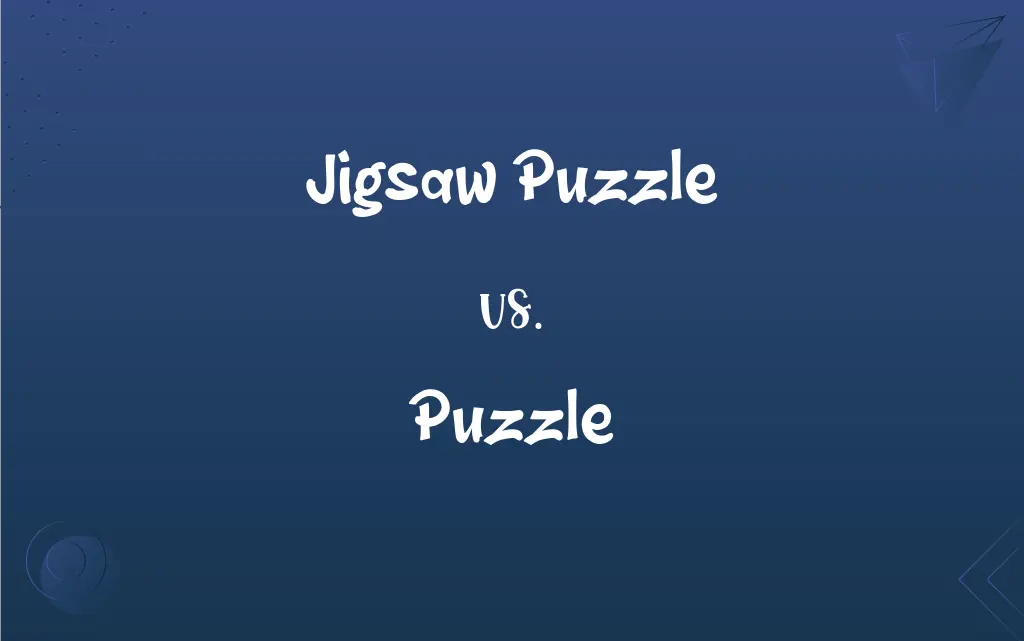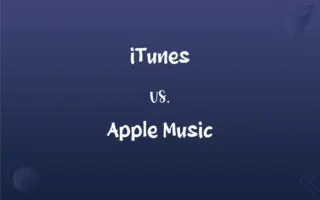Jigsaw Puzzle vs. Puzzle: What's the Difference?
Edited by Aimie Carlson || By Janet White || Published on February 15, 2024
A jigsaw puzzle is a specific type of puzzle consisting of interlocking pieces that form a picture when assembled, while a puzzle is a general term for any problem or game designed to test ingenuity or knowledge.

Key Differences
A jigsaw puzzle is a specific kind of puzzle, characterized by its interlocking pieces that form a complete picture when assembled correctly. Puzzles, in a broader sense, encompass a wide variety of challenges, including brain teasers, crosswords, and riddles, that may not involve physical pieces.
Jigsaw puzzles are tangible, made of materials like cardboard or wood, and involve the physical assembly of pieces. Other puzzles can be intangible, like logical or mathematical problems, and can be solved mentally or on paper.
Jigsaw puzzles rely heavily on visual and spatial skills, as players must identify and match pieces based on shape and image. Other puzzles may rely more on verbal, mathematical, or logical skills, such as deciphering codes or solving equations.
Jigsaw puzzles have a specific history, originating as a teaching tool in the 18th century, and have evolved into a popular leisure activity. Puzzles, in general, have a diverse and ancient history, appearing in various cultures as intellectual challenges and entertainment.
Jigsaw puzzles are often used for relaxation, as a leisure activity, and for improving visual-spatial reasoning. Broader puzzle types serve a range of purposes, from entertainment to educational tools, and can appeal to different intellectual interests.
ADVERTISEMENT
Comparison Chart
Definition
Interlocking pieces forming a picture
General term for problems or games
Physical Nature
Tangible, made of cardboard or wood
Can be tangible or intangible
Skills Required
Visual and spatial skills
Varied, including logical, verbal, mathematical
Historical Development
Originated as a teaching tool in 18th century
Diverse origins, ancient intellectual challenges
Purpose
Leisure, relaxation, spatial reasoning
Entertainment, education, intellectual challenge
ADVERTISEMENT
Jigsaw Puzzle and Puzzle Definitions
Jigsaw Puzzle
A jigsaw puzzle is a tangible game often made of cardboard or wood.
The children excitedly opened the box of the new jigsaw puzzle.
Puzzle
A puzzle can be an educational tool, improving skills like vocabulary.
The teacher used word puzzles to enhance the students' vocabulary.
Jigsaw Puzzle
A jigsaw puzzle challenges spatial reasoning and problem-solving.
Completing the jigsaw puzzle was a satisfying test of her spatial skills.
Puzzle
A puzzle is often a brain teaser that tests logical thinking.
Solving the logic puzzle took careful thought and deduction.
Jigsaw Puzzle
A jigsaw puzzle is a popular leisure activity for relaxation.
They enjoyed a quiet evening working on a jigsaw puzzle together.
Puzzle
A puzzle comes in many forms, including physical and mental challenges.
The escape room offered a variety of puzzles to solve.
Jigsaw Puzzle
A jigsaw puzzle consists of interlocking pieces that form a picture.
She spent hours assembling the jigsaw puzzle of a scenic landscape.
Puzzle
A puzzle is an intellectual challenge that can entertain and educate.
He enjoyed puzzles that challenged his mathematical skills.
Jigsaw Puzzle
A jigsaw puzzle is a picture divided into pieces to be reassembled.
The jigsaw puzzle depicted a beautiful sunset over the ocean.
Puzzle
A puzzle is a game that requires problem-solving or ingenuity.
The crossword puzzle in the newspaper was particularly challenging.
Puzzle
Something, such as a game, toy, or problem, that requires ingenuity and often persistence in solving or assembling.
FAQs
Are all puzzles jigsaw puzzles?
No, jigsaw puzzles are a specific type of puzzle among many other forms.
Are jigsaw puzzles good for the brain?
Yes, jigsaw puzzles can improve visual-spatial reasoning and problem-solving skills.
What is a puzzle?
A puzzle is a general term for any problem or game designed to test ingenuity or knowledge.
What ages are suitable for jigsaw puzzles?
Jigsaw puzzles are suitable for all ages, with varying levels of difficulty.
Are jigsaw puzzles only for children?
No, jigsaw puzzles are enjoyed by people of all ages.
What is a jigsaw puzzle?
A jigsaw puzzle is a game consisting of interlocking pieces that form a picture when assembled.
Can puzzles be educational?
Yes, many puzzles are designed to be educational, enhancing various cognitive skills.
Can puzzles be digital?
Yes, puzzles can be both physical and digital, including online brain teasers.
Can puzzles be used in therapy?
Yes, puzzles are often used in therapeutic settings for cognitive and emotional development.
How long does it take to complete a jigsaw puzzle?
The time to complete a jigsaw puzzle varies depending on its complexity and the solver's skill.
Do puzzles improve IQ?
Regularly solving puzzles can improve aspects of intelligence, like problem-solving abilities.
Are there online platforms for puzzle games?
Yes, there are many online platforms offering a variety of puzzle games for different skill levels.
Do puzzles help with learning?
Yes, puzzles can aid learning by improving memory, concentration, and logic skills.
Are puzzles good for team-building?
Yes, puzzles can be effective team-building activities, promoting collaboration and problem-solving.
How are jigsaw puzzles made?
Jigsaw puzzles are typically made by printing an image on cardboard and cutting it into interlocking pieces.
Can solving puzzles relieve stress?
Yes, solving puzzles can be a relaxing and stress-relieving activity.
What's the largest jigsaw puzzle available?
The size of jigsaw puzzles varies, with some designed to be thousands of pieces.
Are there competitive puzzle solving events?
Yes, there are competitive events for various types of puzzles, including jigsaw puzzles.
Can jigsaw puzzles be custom-made?
Yes, custom-made jigsaw puzzles can be created from personal photographs or designs.
What skills do jigsaw puzzles develop?
Jigsaw puzzles develop spatial reasoning, patience, concentration, and problem-solving skills.
About Author
Written by
Janet WhiteJanet White has been an esteemed writer and blogger for Difference Wiki. Holding a Master's degree in Science and Medical Journalism from the prestigious Boston University, she has consistently demonstrated her expertise and passion for her field. When she's not immersed in her work, Janet relishes her time exercising, delving into a good book, and cherishing moments with friends and family.
Edited by
Aimie CarlsonAimie Carlson, holding a master's degree in English literature, is a fervent English language enthusiast. She lends her writing talents to Difference Wiki, a prominent website that specializes in comparisons, offering readers insightful analyses that both captivate and inform.







































































